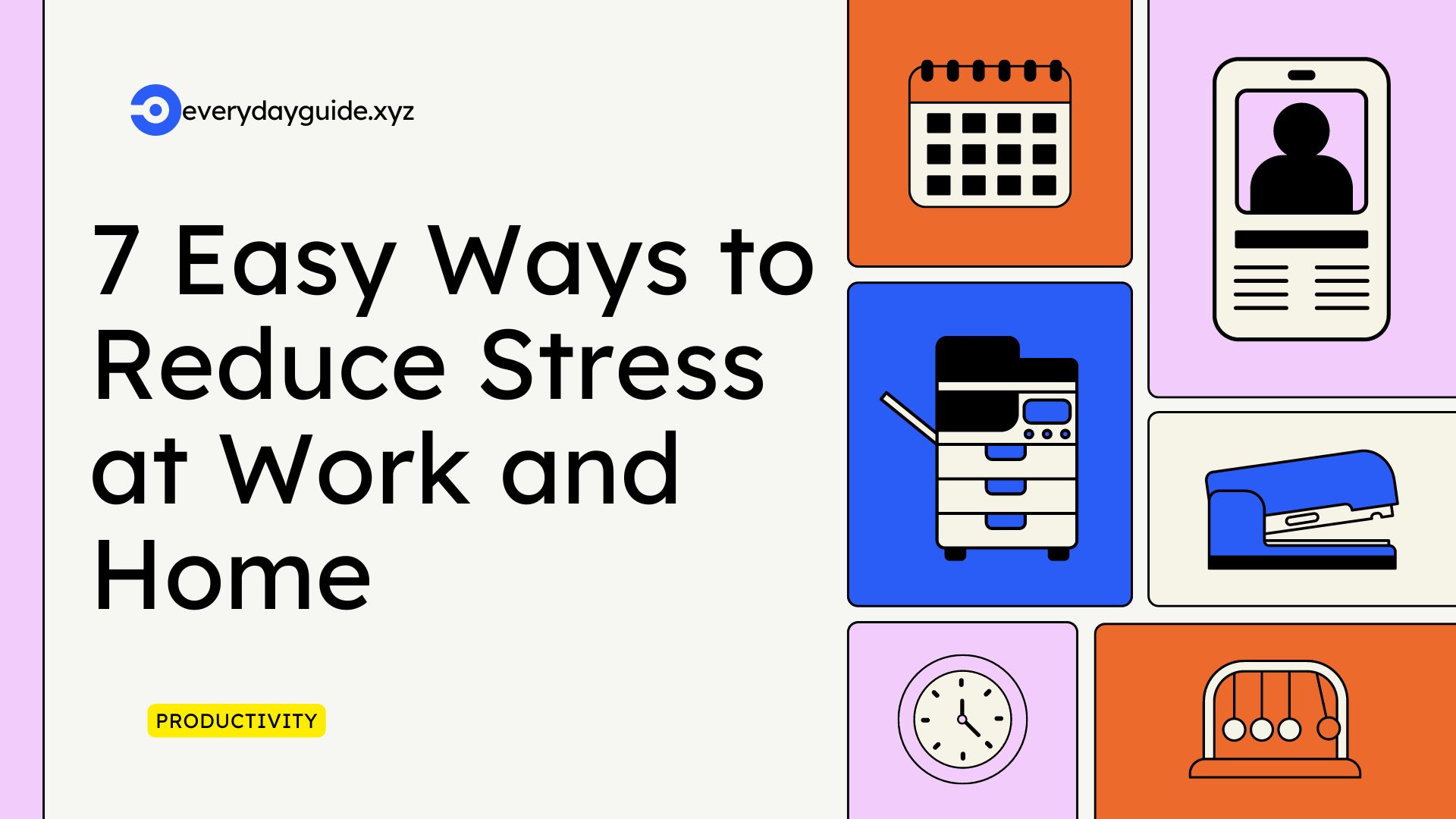With the constant bouncing between work and home, stress can sneak in from all angles and get into our heads. Not addressing it, can result in burnout, physical health issues and breakdowns in relationships. Not to worry — there are effective ways to reduce stress and improve your health. So, this step-by-step guide will navigate you through the waters of 7 simple techniques to lower your stress at work and home that can offer practical alternatives for how you not have a healthy life but also one full of harmony.
Comprehending Stress: Why It is Important

While stress is a natural response in tough times, often it goes on long-term damaging both your mental and physical health. At work, it may be the pressure to meet deadlines, push through large projects or the stress of dealing with a difficult coworker. Handling responsibilities such as money management, caregiving or housekeeping at home may also cause stress. Part of living a high-quality life is identifying what causes stress in your life and how you can manage them better.
Stress management is done through employing methods to deal with both the psychological and physical facets of stress. Practicing these methods in your everyday life can help you mitigate stress and enhance your quality of life. Here are seven easy ways to do that.
Prioritize and Organize Your Job
Create a Daily To-Do List
Here are 7 easy ways to reduce stress at work and home, with a focus on creating a daily to-do list:
- Prioritize Tasks: Start each day by listing your most important tasks. Tackle high-priority or difficult tasks first to relieve pressure as the day progresses.
- Break Tasks Into Manageable Steps: Break larger tasks into smaller, more achievable steps. This makes big projects less overwhelming and allows you to check off progress as you go.
- Set Realistic Goals: Make sure your daily to-do list is realistic. Avoid overloading yourself with too many tasks, as this can lead to stress if they’re not completed.
- Schedule Breaks: Include short breaks in your to-do list to recharge. Brief pauses help refresh your mind and prevent burnout.
- Limit Multitasking: Focus on completing one task at a time. Multitasking can lead to errors and increased stress, so give full attention to each item on your list.
- Review and Adjust: At the end of the day, review what you’ve accomplished. Adjust your next day’s to-do list based on unfinished tasks and new priorities.
- Celebrate Small Wins: Cross tasks off your list as you complete them. Acknowledging small achievements can boost your mood and reduce stress throughout the day.
Creating and following a well-organized daily to-do list can help you stay on top of tasks and keep stress levels in check at both work and home.
Staying organized is one of the best stress cutters. Use a daily to do list to stay on top of tasks and manage time correctly Every day, write down your priorities and rift them into bite-sized pieces. Not only will it give you clarity about what should be done but also a feeling of achieved progress checking-off completed tasks.
Also Read More:
- How to Get Started with Decluttering Your Home
 Spring conjures up thoughts of decluttering the home, but organizing and purging your things can actually be a way to reduce stress for a happier disposition on life. It may seem daunting at first, but learning how to declutter your home… Read more: How to Get Started with Decluttering Your Home
Spring conjures up thoughts of decluttering the home, but organizing and purging your things can actually be a way to reduce stress for a happier disposition on life. It may seem daunting at first, but learning how to declutter your home… Read more: How to Get Started with Decluttering Your Home - 7 Clever Ways to Organize Your Travel Toiletries
 Traveling is always fun and difficult at the same time, especially when it comes to carrying those toiletries with you. It is very important to know how to organize your travel toiletries in order for you have a hassle free trip.… Read more: 7 Clever Ways to Organize Your Travel Toiletries
Traveling is always fun and difficult at the same time, especially when it comes to carrying those toiletries with you. It is very important to know how to organize your travel toiletries in order for you have a hassle free trip.… Read more: 7 Clever Ways to Organize Your Travel Toiletries - The Best Exercises for Quick Weight Loss at Home
 You can lose weight quickly and you need not be a member of the gym or have expensive equipment. Here we have collected a list of home-based bodyweight exercises, with some help from the smart trainees on Reddit. These The Best… Read more: The Best Exercises for Quick Weight Loss at Home
You can lose weight quickly and you need not be a member of the gym or have expensive equipment. Here we have collected a list of home-based bodyweight exercises, with some help from the smart trainees on Reddit. These The Best… Read more: The Best Exercises for Quick Weight Loss at Home - How to Tell if Your Food is Still Safe to Eat
 In order to achieve good health and remain safe from foodborne illnesses, one must take steps in ensuring their food that they cook for themselves or serve their loved ones with is safe. There are a number of different ways that… Read more: How to Tell if Your Food is Still Safe to Eat
In order to achieve good health and remain safe from foodborne illnesses, one must take steps in ensuring their food that they cook for themselves or serve their loved ones with is safe. There are a number of different ways that… Read more: How to Tell if Your Food is Still Safe to Eat - 5 Simple Steps to Lose Weight Without Starving Yourself
 Getting slim doesn’t have to mean you can never eat your favorite foods and always feel hungry. In reality, the best weight loss approaches involve tricks and habits (not secrets at all) that can be easily implemented into your busy life.… Read more: 5 Simple Steps to Lose Weight Without Starving Yourself
Getting slim doesn’t have to mean you can never eat your favorite foods and always feel hungry. In reality, the best weight loss approaches involve tricks and habits (not secrets at all) that can be easily implemented into your busy life.… Read more: 5 Simple Steps to Lose Weight Without Starving Yourself
Work with Time Management Techniques

It helps in avoiding stress: Time management is key to ease your stress. Working in focused intervals with short breaks using techniques such as the Pomodoro Technique, as an example has helped to get more done and reduced feelings of overwhelmed. Here are Also, third party calendar apps and scheduling app would make you plan your day accordingly and should avoid any early morning or last-minute rushes.
Mindfulness and Meditation Practice (Practice Mindfulness Techniques)
Mindfulness is being fully present in the moment, without judgment. By practicing mindfulness, you shines a light on your mind and how it works and over time with increased awareness of thoughts and feelings you are better equipped to respond instead of react. Deep-breathing, progressive muscle relaxation and guided imagery are all ways to center yourself and be present in the moment when you start feeling like you’re about to panic.
Incorporate Daily Meditation
Stress management through meditation: Relax and Meditate — Just 5 minutes of meditation per day goes a long way in your mind wellness. Try to add Meditation in your daily routine by allocating time in morn or night, wherever you feel convenient. Apps and online resources can provide guided meditation practices that will help you get into routine.
Keep a work-life balance (Set Clear Boundaries)
One must strike a work-life balance to be stress-free. Improve your work-life balance by separating time for work from personal time, establishing hours of work and precisely following them as well. In particular, refrain from checking work emails or taking work calls after hours so that you have time to relax and unwind.

Schedule Regular Breaks
Burnouts often happen when we push ourselves too hard over a long period of time and so regular breaks throughout the work day will not only prevent this, but it will allow you to be more productive. Taking short breaks from your desk, has the effect of stretching and unwinding. Plan a few things like go for a walk, do some breathing exercises, maybe an quick hobby to rejuvenate yourself.
Foster a Strong Social Support System (Reach Out to Friends and Family)
Building a strong social support system helps to deal with stress. Find someone to share your talk and answer my question with — a friend or family member. Emotional support, practical help and a feeling of belonging are all positive aspects of social connection which can reduce feelings of stress.
Become Associated With Support groups / Communities
Look into participating in support groups or communities around things you are passionate about or struggling with They can also create a community where people are trying to learn how to handle stress and not be taken in by day-to-day pressures. Whether it be an online forum, a local meetup or even a professional network — linking with others who have been in your shoes can only help.
Exercise Regularly (Add Some Cardio Only Routine)
Regular physical activity that is known to help reduce stress. Endorphins, natural mood elevators, are released when you exercise, which can diminish anxiety and depression. Work towards and try to get at least 30 minutes of moderate exercise on most days. Walking, jogging, cycling or yoga are good stress relievers.
Choose Activities You Enjoy
Anything that makes physical activity a part of your daily lifestyle or routine. Choose exercises you enjoy doing so youll stick with it. The more you enjoy an activity, the more likely you are to stick with it. Whatever works for you, if it is dancing, swimming or hiking; ON REGULAR BASIS IN YOUR LIFE.
Develop Healthy Eating Habits (Focus on Nutrient-Rich Foods)
As much as what you eat affects your stress levels. A healthy diet of fruits and veggies, whole grains, and lean proteins can stabilize your mood swings and energyushima K, Ma L. «Dietary polyphenols as potential nutraceuticals against Journals of Affective Disorders. Try to avoid consuming caffeine, sugar and processed foods into an excessive amount since they can raise the stress level and anxiety.
Stay Hydrated
Hydration is also critical for stress management. Dehydration causes tirednesss and moodiness which might make an individual feel more pressured. Try to stay well-hydrated over the course of the day and reduce your consumption of caffeinated and alcoholic beverages, which tend to dehydrate your body.
Embrace Relaxation Techniques
Deep breathing exercises help to turn on the relaxation response in your body, which reduces stress and creates a calm sense of peace. Breathe deeply, you will need to take it slowly through your nostril and subsequently keep the breath for some seconds after exhaling out of your mouth By adding these practices to your day, stress management is only going to get easier.
Try Some other Relaxation Techniques
Try other relaxation strategies like progressive muscle relaxation, aromatherapy or listening to calming music in addition to deep breathing. Practice them, find out which ways work well for you and include it as part of your routine to be better equipped in managing stress.
Conclusion
Balancing work stress and home life are key to having a full well-rounded life. But there are simple ways that you can start incorporating into your day-to-day to reduce stress and improve your quality of life. Good thing, there are several techniques you can employ to keep your stress under check: Setting priorities, cultivating mindfulness, juggling a work-life balance, building social connections and relationships, regular exercise and eating better (although this will not induce slimming), relaxation practices — all of which are invaluable tools YOU have in YOUR stress-busting toolbox. Start ingraining these mindsets into your system little by little, and see how much less you begin to stress out and/ or feel good about in the process.

